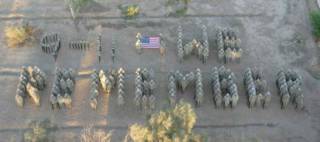Bosnian War Comes To An End
By Jim Garamone
American Forces Press Service
WASHINGTON, Dec. 2, 2004 – The stabilization mission in
Bosnia is complete and
American servicemembers who served in the region can look
with pride on their
accomplishments, said DoD officials today.
European Union soldiers officially take over the Bosnia
mission today. U.S.
soldiers and their NATO allies have finished an almost
nine-year mission in the
Balkan country.
Nathan Bein, DoD's country director for Bosnia-Herzegovina,
said the NATO force
had accomplished all of its missions. The force, which
started with 60,000
soldiers, was to separate the warring factions, disarm
them, place heavy
weapons in cantonment facilities and to set up
demilitarized zones between the
parties.
In December 1995, the force went in to end the civil war
between the Bosnian
Serbs and Croat/Muslim federation. The Dayton Agreement
created a joint
multiethnic and democratic government. But there were two
entities roughly
equal in size: the Bosniak/Croat Federation of Bosnia and
Herzegovina and the
Bosnian Serb-led Republika Srpska.
The first NATO force into the country confronted a
destroyed infrastructure and
a refugee crisis. Areas of the country had been pounded by
war and many areas
contained ghost towns.
NATO forces arrived ready to enforce a peace if need be or
to simply separate
the forces. The opposing sides were tired of war, and
except for some local
problems, both sides cooperated with the NATO force. An
American general
commanded the NATO force, with the allies having different
sections. The U.S.
section was centered in Tuzla.
The area around Tuzla is primarily agricultural and
contains both Federation
and Republika Srpska territory. American soldiers
immediately set about making
life better for the residents.
Today, the area around Tuzla is peaceful. While there
remain some local
problems, "they are past the stage of wanting to kill each
other," Bein said.
What is key to the process is that there are jobs for
people and there is
stability. "They can hope for a better life for themselves
and their children,"
Bein said.
And it is like that throughout the country. The Republika
Srpska is a bit
behind the Federation as far as recovery goes, but the
improvement even there
is startling. "In Sarajevo, it is starting to look much
like the rest of
Western Europe now," he said.
The street lights work, there are hotels and grocery stores
and gas stations,
just like anywhere else. "It's not Nirvana, but the
contrast of what's there
now and what was there in [1995 and 1996] is like night and
day," Bein said.
It was in Bosnia also that the U.S. reserve components
showed their worth.
Military civil affairs professionals – mostly reservists –
handled delicate
negotiations among warring parties. Combat service and
combat-service support
units deployed to the country and worked in the mud to
ensure operations ran
smoothly.
As the mission went on, National Guard units – notably the
49th Armored Division
of the Texas Guard and the 29th Infantry Division of the
Virginia/Maryland Guard
– took over major portions of the mission in the country.
The 49th had the first
Guard brigade to serve in country, while the 29th was the
first Guard unit to
command the entire American sector. The 28th and 35th
Infantry divisions and the
38th Infantry Brigade were among other Guard units that
served as part of Task
Force Eagle.
The end of the NATO mission does not mean the end of U.S.
interest and concern
in Bosnia, Bein said. NATO will maintain a small
headquarters unit in Sarajevo.
Its three missions are to assist the unified Bosnian
government in defense
reform as it prepares to enter NATO's Partnership for Peace
program. The
headquarters will also continue to pursue and apprehend
remaining war criminals
and, finally, the headquarters will work on
counterterrorism programs to ensure
terrorists do not find a foothold in the country.
Bosnia has also asked the United States to maintain a
presence at the Tuzla
base. The base will be maintained and ready to expand if
needed. All told,
there will be about 150 U.S. servicemembers in Bosnia.
------------------------------------------------------------------------
A well deserved Congradulations, and a job well done Soldiers!!!!
------------------------------------------------------------------------
I would like to know however, where were the anti-war protestors when Clinton sent us there?
American Forces Press Service
WASHINGTON, Dec. 2, 2004 – The stabilization mission in
Bosnia is complete and
American servicemembers who served in the region can look
with pride on their
accomplishments, said DoD officials today.
European Union soldiers officially take over the Bosnia
mission today. U.S.
soldiers and their NATO allies have finished an almost
nine-year mission in the
Balkan country.
Nathan Bein, DoD's country director for Bosnia-Herzegovina,
said the NATO force
had accomplished all of its missions. The force, which
started with 60,000
soldiers, was to separate the warring factions, disarm
them, place heavy
weapons in cantonment facilities and to set up
demilitarized zones between the
parties.
In December 1995, the force went in to end the civil war
between the Bosnian
Serbs and Croat/Muslim federation. The Dayton Agreement
created a joint
multiethnic and democratic government. But there were two
entities roughly
equal in size: the Bosniak/Croat Federation of Bosnia and
Herzegovina and the
Bosnian Serb-led Republika Srpska.
The first NATO force into the country confronted a
destroyed infrastructure and
a refugee crisis. Areas of the country had been pounded by
war and many areas
contained ghost towns.
NATO forces arrived ready to enforce a peace if need be or
to simply separate
the forces. The opposing sides were tired of war, and
except for some local
problems, both sides cooperated with the NATO force. An
American general
commanded the NATO force, with the allies having different
sections. The U.S.
section was centered in Tuzla.
The area around Tuzla is primarily agricultural and
contains both Federation
and Republika Srpska territory. American soldiers
immediately set about making
life better for the residents.
Today, the area around Tuzla is peaceful. While there
remain some local
problems, "they are past the stage of wanting to kill each
other," Bein said.
What is key to the process is that there are jobs for
people and there is
stability. "They can hope for a better life for themselves
and their children,"
Bein said.
And it is like that throughout the country. The Republika
Srpska is a bit
behind the Federation as far as recovery goes, but the
improvement even there
is startling. "In Sarajevo, it is starting to look much
like the rest of
Western Europe now," he said.
The street lights work, there are hotels and grocery stores
and gas stations,
just like anywhere else. "It's not Nirvana, but the
contrast of what's there
now and what was there in [1995 and 1996] is like night and
day," Bein said.
It was in Bosnia also that the U.S. reserve components
showed their worth.
Military civil affairs professionals – mostly reservists –
handled delicate
negotiations among warring parties. Combat service and
combat-service support
units deployed to the country and worked in the mud to
ensure operations ran
smoothly.
As the mission went on, National Guard units – notably the
49th Armored Division
of the Texas Guard and the 29th Infantry Division of the
Virginia/Maryland Guard
– took over major portions of the mission in the country.
The 49th had the first
Guard brigade to serve in country, while the 29th was the
first Guard unit to
command the entire American sector. The 28th and 35th
Infantry divisions and the
38th Infantry Brigade were among other Guard units that
served as part of Task
Force Eagle.
The end of the NATO mission does not mean the end of U.S.
interest and concern
in Bosnia, Bein said. NATO will maintain a small
headquarters unit in Sarajevo.
Its three missions are to assist the unified Bosnian
government in defense
reform as it prepares to enter NATO's Partnership for Peace
program. The
headquarters will also continue to pursue and apprehend
remaining war criminals
and, finally, the headquarters will work on
counterterrorism programs to ensure
terrorists do not find a foothold in the country.
Bosnia has also asked the United States to maintain a
presence at the Tuzla
base. The base will be maintained and ready to expand if
needed. All told,
there will be about 150 U.S. servicemembers in Bosnia.
------------------------------------------------------------------------
A well deserved Congradulations, and a job well done Soldiers!!!!
------------------------------------------------------------------------
I would like to know however, where were the anti-war protestors when Clinton sent us there?








































2 Comments:
I don't know how anyone can call 9 years of blowing people up "progress". What history has certainly shown us is that wars are temporary fixes, or sometimes don't fix it at all. Take the Israel/Palestine war--been going on for centuries ain't about to end now. *sighs* Give it about 20 years, and some other country that was formerly Russia will start killing each other again, some other Arab nation blowing the hell out of its people, and us on the sidelines going "No no no, bad!" and sending in troops to "preserve" the peace.
Not to mention our own Civil War. Mississippi seems to work quite well with New Jersey today
:-) Sometimes there is only one way to stop tyranny's and tirents. Especially those that threaten The United States Of America. Freedom isnt Free, Peace isnt Pretty.
Post a Comment
<< Home